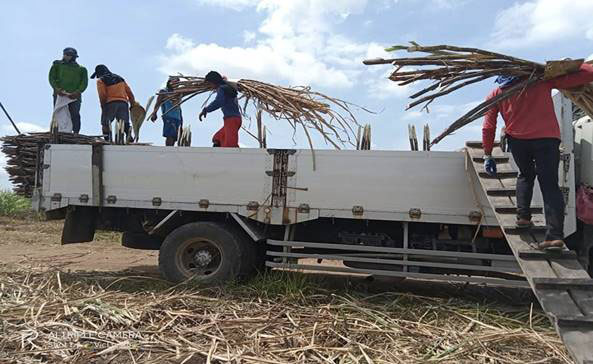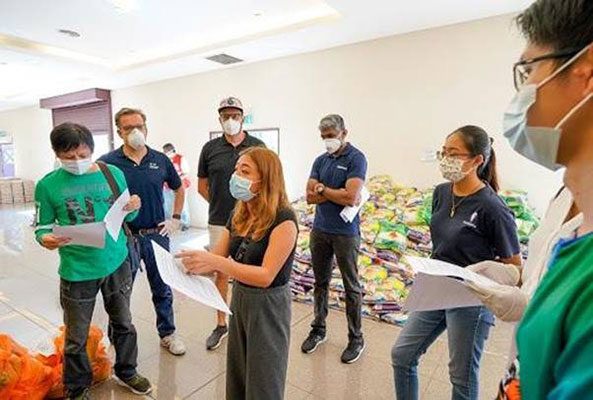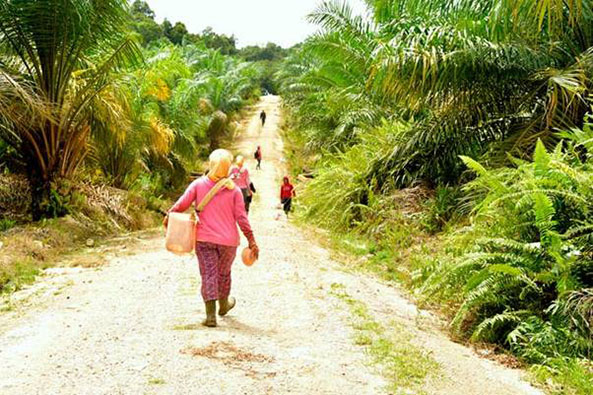
Farmworkers in the northern Philippines load trucks with sugarcane stalks, which is one of several laborious tasks for which they are minimally compensated. (Photo from UMA)
While 170,000 farmers and farm workers worldwide are killed annually due to unsafe working conditions and suffer twice the risk of death compared to other industries, the agricultural sector remains systemically underrepresented in the discourse on human rights.
On December 10, 2021, International Human Rights Day, the Coalition of Agricultural Workers International (CAWI) organized the webinar “Agri Workers’ Rights are Human Rights“ to expose rural working conditions while highlighting sectoral challenges and actions to raise these issues on an international scale.
“As a human being, everyone is entitled to human rights regardless of caste, race, occupation, sex, and language.” Fatima Burnad of the India-based Society for Rural Education and Development (SRED) and chairperson of CAWI stressed. Burnad, who moderated the webinar, memorialised the 700 farm workers who had died last year during the farmers’ protests in India.
Other seasoned agricultural workers’ leaders and advocates from the Asia Pacific region joined the discussion, including Daisy Arago, executive director of the Center for Trade Union and Human Rights (CTUHR) from the Philippines; Manggalam Panjasaram of Tenaganita from Malaysia; Helda Khasmy of SERUNI from Indonesia; Cita Managuelod of Unyon ng Manggagawang Agrikultura (UMA) from the Philippines; and CAWI secretary-general P.P. Sivapragasam of the Human Development Organization (HDO) from Sri Lanka.
“Human rights are not given, it has to be struggled, it has to be fought for, and most importantly, human rights are product of the economic struggle of men and women to live,” CTUHR’s Arago stressed in her input.
Arago noted that with the integration of International Labor Organization (ILO) in the United Nations (UN) and the legal integration into the Universal Declaration of Human Rights (UDHR) of the many labor rights won in centuries of struggle, UN member states are obliged to incorporate ILO conventions and principles of UDHR into their national laws.

Malaysian migrants group Tenaganita organizes relief operations for agricultural workers amid the COVID-19 pandemic. (Photo from Tenaganita)
Meanwhile, Panjasaram of Tenaganita shared the issues faced by migrant workers during the COVID-19 pandemic. “Majority of migrant workers in Malaysia are farmworkers. (Even) prior to COVID-19 pandemic, they (already) face abhorrent conditions like forced labor, months of delay in wages, long work hours, unsafe working conditions, and forced evictions in the places where they stay,” she said.
Exacerbated by the COVID-19 pandemic, these burdens weighed heavier as the inability of workers to renew work permits placed them in a more vulnerable position than ever before. Panjasaram shared that Tenaganita has initiated projects to help migrant workers during the pandemic, including food relief and rent relief and dissemination of information on COVID-19.
In the Philippines, more than 2,000 sugarcane farm workers engaged in one of the most difficult and dangerous plantation work where they faced slave-like wages, landlessness, and harassment from state agents. According to the Philippine Statistics Authority (PSA), in 2019, the average wage rate of farmworkers is PHP 331.10 (USD 6.60), but it is far from the wages received by farmworkers in reality. For example, in Isabela province, farmworkers received only PHP250.00 (USD 5.00), which could hardly provide a decent living. Sometimes, workers are paid less through piecework wages or locally known “pakyaw” instead of getting the minimum wage rate.
“Filipino sugarcane farmworkers do not enjoy sick leaves, vacation leaves, overtime pay, and other benefits mandated by law such as 13th-month pay, social security, and health benefits. Moreover, the plantation companies do not provide workers with personal protective equipment,” UMA’s Managuelod said.
Aside from the poor labor conditions in the plantations, continuous and intensified harassment by state agents also threatens the workers’ rights. “Members of workers’ associations face surveillance, armed harassment, vilification, red-tagging, and false accusations. They are also coerced to leave their organization,” she added.
As a response, agricultural workers in the Philippines launched a campaign on human rights, wages, benefits, and land rights. UMA has been reaching out to affected communities and mobilizing them to defend their rights and welfare.
In Indonesia, SERUNI’s Khasmy noted how plantation owners ignore laws and regulations that determine the wages and rights of workers. “Peasant workers in rural areas until now are very unfamiliar (with) or not covered by national regulations, and even by the ILO Conventions which the state has ratified,” she said.

A woman agricultural worker in a palm oil plantation in Kalimantan, Indonesia. (Photo: CIFOR, CC BY-NC-ND 2.0)
Agricultural workers, especially women, suffer the harsh realities of lack of land ownership, limited employment opportunities, acute poverty, low wages, and a very strong and widespread patriarchal system in the countryside, Khasmy pointed out.
Sivapragasam, CAWI secretary-general, emphasized that while agricultural workers play an essential role in the local economy, their rights are hardly recognized by the state and their employers. “That is why CAWI as a coalition is bringing people, partners, and members together to work on the rights of agricultural workers,” said the CAWI official.
“CAWI could act on its existing action plans from the recently concluded Global People’s Summit to protect, promote, ensure the rights of agricultural workers in our region and globally,” added Sivapragasam. ###

